High Cortisol and Belly Fat: Can Supplements Help?
Introduction
When you’re stressed, your body shifts into survival mode. Your heart races, your muscles tense, and your brain sharpens — all thanks to cortisol, the body’s main stress hormone.
But when stress becomes constant, that same hormone that helps you survive begins to work against you — especially around your midsection.
Many people struggling with belly fat don’t realize that cortisol may be a major player behind the scenes. Chronic stress raises cortisol, and over time this can encourage fat storage in the abdominal area.
This isn’t just about aesthetics. Belly fat, especially visceral fat (the kind that wraps around internal organs), increases inflammation and risk of metabolic disease. The good news? There are natural ways — including supplements — that can help regulate cortisol and bring your metabolism back into balance. 🌿
Looking for supplements for This? Click here.
🌞 What Cortisol Does in the Body
Cortisol isn’t the enemy — it’s essential. It:
Helps wake you up in the morning
Regulates blood sugar and energy
Supports the immune system
Helps the body respond to physical or emotional stress
But chronic stress — emotional strain, poor sleep, caffeine overload, or under-eating — keeps cortisol high for too long.
That constant elevation shifts your metabolism from “balance” to “storage.”
🌙 How High Cortisol Leads to Belly Fat
Fat Storage Patterns Change
Visceral fat cells have more cortisol receptors than subcutaneous (under-skin) fat. That means cortisol has a stronger effect on belly fat — encouraging storage deep in the abdomen.
Cravings and Appetite Spike
Cortisol increases appetite, particularly for quick-energy foods: sugar, carbs, and salt. These foods raise insulin, which — combined with cortisol — signals the body to store fat, not burn it.
Muscle Breakdown and Slowed Metabolism
Chronically high cortisol increases muscle breakdown (catabolism) to free up amino acids for energy. Less muscle means slower metabolism — and more fat retention.
Blood Sugar Instability
Cortisol raises blood glucose to prepare your body for action. But when there’s no physical action (like during desk stress), insulin surges to bring glucose down, pushing sugar into fat storage.
Sleep Disruption
Poor sleep raises cortisol the next day, creating a vicious cycle: high cortisol → poor sleep → higher cortisol → more belly fat. 🌙
🌿 The Emotional Side of Cortisol Weight
People often describe cortisol-related weight gain as “stress weight” — weight that appears even without overeating. You might feel wired but tired, snack without control, and notice stubborn belly fat that won’t respond to diet alone.
This isn’t willpower failure — it’s hormonal imbalance. To fix it, you must calm the stress response first. That’s where nutrition, sleep, and targeted supplements come in.
🌞 Can Supplements Help?
Yes — some supplements can support your stress response, reduce cortisol, and help rebalance your metabolism. They’re not magic bullets, but they can make a real difference when combined with lifestyle changes.
Let’s explore the best-researched ones. 🌿
🌿 Ashwagandha: The Cortisol-Regulating Adaptogen

Ashwagandha is an Ayurvedic herb known for its ability to lower cortisol and support resilience.
Clinical studies show that ashwagandha extract can reduce cortisol by up to 30% and improve weight management in adults under chronic stress.
It works by regulating the HPA axis — the brain-to-adrenal pathway that governs cortisol release.
Instead of suppressing cortisol, it helps your body adapt: producing more when needed, less when you’re overstressed.
Typical dosage: 300 mg (root extract, standardized to 5% withanolides) twice daily.
You may notice:
Calmer mood
Better sleep
Reduced sugar cravings
Easier fat loss over time 🌸
🌿 Omega-3 Fatty Acids: Anti-Inflammatory and Cortisol-Balancing
Cortisol and inflammation feed each other — high stress increases inflammation, and inflammation triggers more cortisol release.
Omega-3s (EPA and DHA from fish oil) break this cycle.
Studies show that omega-3 supplementation can lower cortisol during stressful tasks and improve insulin sensitivity — helping prevent the blood sugar swings that drive belly fat.
Typical dosage: 1.5–3 g combined EPA/DHA daily.
Best taken with meals for absorption.
Beyond cortisol balance, omega-3s enhance mood and brain health — key when emotional stress drives overeating. 🌿
🌸 Magnesium: The Mineral of Calm
Magnesium is essential for over 300 biochemical reactions, including those regulating the nervous system and cortisol secretion.
When you’re stressed, magnesium is excreted faster — meaning chronic stress often leads to magnesium deficiency.
Low magnesium = higher cortisol, more anxiety, poor sleep.
Supplementing magnesium glycinate or threonate helps restore calm and balance, easing the “wired-but-tired” pattern common with adrenal fatigue.
Typical dosage: 200–400 mg nightly (glycinate or citrate form). 🌙
Looking for supplements for This? Click here.
🌿 Phosphatidylserine: Nighttime Cortisol Regulator
This phospholipid, naturally found in brain cells, helps the body shut down cortisol production when it’s no longer needed — particularly at night.
Studies show phosphatidylserine supplementation lowers cortisol after intense exercise or evening stress, improving sleep and recovery.
When your body learns to lower cortisol before bed, you’ll find it easier to lose fat, recover from workouts, and wake up refreshed.
Typical dosage: 200–400 mg in the evening. 🌸
🌸 Vitamin C: The Adrenal Buffer
Your adrenal glands store and use vitamin C to produce and regulate cortisol. During prolonged stress, vitamin C levels drop.
Supplementation can reduce cortisol after stressful events and enhance immune function — making it one of the simplest, most affordable ways to protect your adrenals.
Typical dosage: 500–1000 mg daily.
Best paired with magnesium and B-complex for overall adrenal support. 🌿
🌿 B-Complex Vitamins: Metabolic and Mood Support
B vitamins — particularly B5, B6, and B12 — are critical for energy production, mood regulation, and adrenal health.
Chronic stress depletes them quickly, leaving you fatigued and mentally foggy. Replenishing them helps stabilize energy and normalize cortisol metabolism.
Tip: Look for methylated forms (e.g., methylcobalamin, methylfolate) for optimal absorption. 🌸
🌞 Rhodiola Rosea: Adaptogen for Calm Energy
Rhodiola supports focus and stamina without overstimulation. It helps modulate stress-related fatigue and maintains healthy cortisol levels.
People who feel drained yet anxious often find Rhodiola restores balanced energy — steady, not spiky.
Typical dosage: 200–400 mg standardized extract (3% rosavins, 1% salidroside).
🌙 Other Helpful Nutrients
Zinc: Supports hormone and immune balance.
CoQ10: Improves mitochondrial energy output, reducing stress-related fatigue.
L-Theanine: Amino acid from green tea that promotes alpha brain waves — calm alertness, not sedation.
🌿 Supplements That Don’t Work as Promised

Many “cortisol blockers” marketed online promise rapid belly-fat loss. Most are unproven.
While some contain ingredients like ashwagandha or phosphatidylserine, the claims of overnight fat melting are exaggerated.
No supplement can “block” cortisol completely — and you wouldn’t want that. Cortisol is vital for survival. The goal is balance, not elimination. 🌸
🌸 Lifestyle Habits That Amplify Supplement Effects
Supplements work best when paired with habits that naturally lower cortisol.
Prioritize Sleep
Lack of sleep raises cortisol the next day. Aim for 7–9 hours in a dark, cool, quiet room.
Manage Stress Daily
Breathwork, meditation, walking, or journaling all lower cortisol naturally. Even 10 minutes helps.
Want to try Breathwork? Click Here.
Exercise Wisely
Moderate activity lowers cortisol; extreme exercise can raise it.
Combine resistance training, walking, and yoga.
Eat Balanced Meals
Avoid skipping meals or crash dieting — both raise cortisol. Include protein, healthy fats, and fiber at each meal to stabilize blood sugar.
Limit Caffeine and Alcohol
Both can overstimulate the adrenal system, keeping cortisol high.
Get Morning Sunlight
Light exposure in the morning helps reset your circadian rhythm and normalize cortisol’s daily rise-and-fall pattern. 🌞
🌿 The Timeline of Change
Balancing cortisol and reducing belly fat isn’t instant. Expect gradual progress:
Week 1–2: Better sleep and calmer mood.
Week 3–4: Reduced cravings, more stable energy.
Week 6–8: Noticeable fat loss around waist and improved body composition.
3 months+: Sustained hormonal balance, higher energy, and reduced abdominal inflammation. 🌸
Consistency matters more than intensity.
🌙 Safety Considerations
All supplements listed are generally safe when used responsibly. Still, keep in mind:
If you’re pregnant, breastfeeding, or on medication (especially for thyroid, diabetes, or blood pressure), consult your doctor first.
Avoid combining multiple adaptogens without guidance — start one at a time.
Listen to your body: if you feel jittery, overstimulated, or overly tired, lower the dose or pause temporarily. 🌿
🌿 The Emotional Perspective
Cortisol isn’t just biochemical — it’s emotional.
Each time you feel unseen, overworked, or pressured to “keep up,” your body hears danger.
Fat storage, then, becomes protection — a biological cushion against chaos.
As cortisol lowers, people often notice not just physical lightness but emotional relief: better patience, deeper calm, and more authentic motivation.
Healing your waistline starts with healing your stress. 🌸
🌞 The Takeaway
Cortisol isn’t your enemy — imbalance is.
Belly fat often reflects chronic stress, poor recovery, and disrupted sleep.
Supplements like ashwagandha, magnesium, omega-3s, phosphatidylserine, and vitamin C can support cortisol balance and fat regulation.
No supplement works alone — diet, sleep, and emotional recovery matter equally.
Focus on restoring rhythm, not chasing extremes.
When stress calms, your body remembers how to function efficiently — burning, not storing.
That’s the true solution to “cortisol belly.” 🌿✨
Looking for online therapy ? Click Here.
📚 References
Choudhary D et al. “Body Weight Management in Adults Under Chronic Stress Through Treatment With Ashwagandha Root Extract.” J Evid Based Complement Altern Med. 2017.
Epel ES et al. “Stress, Cortisol, and Visceral Fat: A Link to Waistline.” Psychosomatic Medicine. 2000.
Ginty AT et al. “Cortisol, Obesity and the Metabolic Syndrome.” PLoS One. 2013.
Harris WS et al. “Omega-3 Supplementation and Stress Reactivity.” Nutrients. 2019.
McEwen BS & Seeman T. “Protective and Damaging Effects of Stress Mediators.” NEJM. 1999.
Lad R. “Supplements to Reduce Cortisol and Belly Fat Explained.” Newsweek. 2024.
“Cortisol Belly: How Stress Can Impact Your Weight.” BSW Health. 2024.
“What Supplements Lower Cortisol? 5 Natural Options.” Health.com. 2024.
Panossian A & Wikman G. “Adaptogens and Stress-Response Modulation.” Phytotherapy Research. 2010.
Jeong D et al. “Ginseng and HPA Axis Modulation in Psychological Stress.” Nutrients. 2020.
Related Posts
-
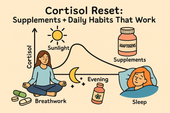
Cortisol Reset: Supplements + Daily Habits That Work
-
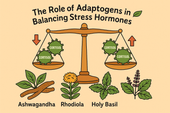
The Role of Adaptogens in Balancing Stress Hormones
Adaptogens work at the root of stress — your nervous system. 🌿 Learn how these powerful herbs help regulate cortisol, calm your nerves, and restore balance between energy and relaxation. ✨
-
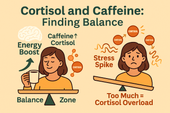
Cortisol and Caffeine: How Much Is Too Much?
Caffeine can boost energy and focus — but too much can overstimulate your stress hormones. ☕ Learn how caffeine affects cortisol, energy levels, and mood, and discover how to find the perfect balance for lasting calm and clarity. 🌿
-
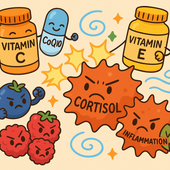
Antioxidants for Stress Management and Cortisol Control
When stress overwhelms your body, antioxidants come to the rescue. 🌿 Learn how vitamin C, CoQ10, and other natural compounds help reduce oxidative stress, regulate cortisol, and restore calm energy from within. ✨
-

Cortisol and Gut Health: How Probiotics May Help
Chronic stress doesn’t just affect your mind — it changes your gut. 🌿 Learn how cortisol disrupts the microbiome and how probiotics can help restore balance, improve digestion, and calm your stress response naturally. ✨
-

Vitamin D and Cortisol: Supporting Immune Balance
Vitamin D does more than strengthen bones — it helps regulate cortisol and support immune balance. 🌞 Learn how this essential hormone-like nutrient restores calm, improves mood, and strengthens your body’s natural stress defenses. 🌿
-
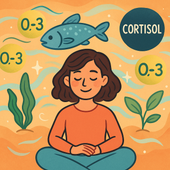
Omega-3s and Cortisol: Fighting Inflammation Naturally
Omega-3s are more than heart-healthy fats — they’re natural cortisol regulators. 🌿 Learn how EPA and DHA help reduce chronic inflammation, calm the nervous system, and support stress recovery from the inside out. ✨
-

How Ginseng Can Support Energy and Cortisol Balance
Ginseng is one of nature’s most powerful adaptogens, helping your body handle stress without burning out. 🌿 Learn how this ancient root supports balanced cortisol, steady energy, and sharper focus — restoring vitality naturally and sustainably. ✨
-
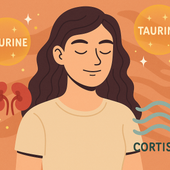
Taurine and Cortisol: Supporting Focus Under Stress
When cortisol surges, focus fades — but taurine helps restore balance. 🌿 Learn how this powerful amino acid calms your nervous system, regulates stress hormones, and sharpens concentration without jitters or fatigue. ✨
-
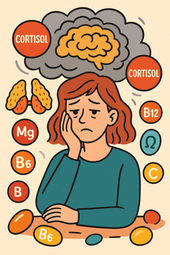
The Link Between Cortisol, Brain Fog, and Nutrient Deficiencies
When brain fog sets in, it’s not just in your head — it’s in your hormones. 🌿 Discover how cortisol imbalance and nutrient deficiencies like low magnesium, B vitamins, and omega-3s can cloud your focus and how restoring balance brings back mental clarity and calm. ✨
-

B Vitamins for Stress, Energy, and Cortisol Regulation
B vitamins are the foundation of stress resilience and steady energy. 🌿 Learn how this essential group of nutrients helps regulate cortisol, restore focus, and keep your nervous system calm — giving you balance from the inside out. ✨
-

Cortisol Imbalance and Chronic Fatigue: Can Supplements Help?
When chronic stress keeps cortisol high, fatigue and brain fog follow. 🌿 Learn how to rebalance your stress hormones naturally with calming nutrients, adaptogens, and lifestyle rituals that restore energy, focus, and inner peace. ✨
-

Adaptogen Stacks for Better Sleep and Lower Stress Hormones
Adaptogens can help your body recover from stress and sleep better by regulating key hormones like cortisol and adrenaline. 🌿 Learn how adaptogen stacks work to restore balance, calm the mind, and rebuild resilience — so you can rest deeply and wake renewed. ✨
-

Phosphatidylserine for Nighttime Cortisol Control
When stress hormones stay high at night, deep rest becomes impossible. 🌙 Discover how phosphatidylserine helps calm the brain, reduce nighttime cortisol, and restore healthy sleep rhythms — so you can wake up peaceful, clear, and recharged. ✨
-

Magnesium for Stress Relief and Cortisol Reduction
Magnesium is one of the most powerful natural tools for stress relief. 🌿 This essential mineral calms your nervous system, lowers cortisol, and helps your body recover from chronic tension. Learn how magnesium replenishes balance, improves sleep, and restores inner peace — naturally. ✨
-

Supplements to Improve Sleep by Balancing Cortisol
When cortisol stays high at night, sleep becomes a struggle. 🌙 Discover natural supplements that calm the nervous system, lower stress hormones, and restore your body’s natural rhythm. From magnesium and ashwagandha to L-theanine and phosphatidylserine, learn how to build deeper, more restorative rest. 🌿
-

Cortisol and Sleep: Why Stress Keeps You Awake
When stress keeps your body in fight-or-flight mode, cortisol refuses to calm down — and sleep becomes impossible. 🌙 Learn how elevated cortisol disrupts your circadian rhythm, suppresses melatonin, and turns restless nights into exhaustion. Discover how to restore balance and reclaim deep rest. ✨
-

L-Theanine for Cortisol Balance and Anxiety Relief
L-Theanine — the calming amino acid from green tea — helps quiet the mind and balance cortisol, the body’s key stress hormone. 🌿 Learn how it promotes calm focus, eases anxiety, and supports deep rest without sedation, backed by modern research and centuries of tradition. ✨
-

Rhodiola Rosea and Stress Resilience: A Natural Cortisol Regulator
Rhodiola rosea is one of nature’s most powerful tools for resilience. 🌿 This Arctic root helps balance cortisol, fight fatigue, and sharpen focus — keeping you calm yet energized even under stress. Discover the science behind Rhodiola’s adaptogenic power and how it helps your body thrive under pressure. ✨
-

Ashwagandha for Cortisol Balance: What the Science Says
Ashwagandha helps your body recover from chronic stress by calming the adrenal system and balancing cortisol — your key stress hormone. 🌿 Learn what science says about this powerful adaptogen, how it restores energy and focus, and why it’s one of nature’s most effective tools for modern stress relief. ✨
-

Supplements That Naturally Lower Cortisol Levels
When cortisol levels calm, your energy transforms — no more crashes or jitters, just steady focus and inner peace. 🌿 Learn which natural supplements and habits lower stress hormones, boost calm energy, and help your body thrive with balance instead of burnout. ✨
-

What Is Cortisol Imbalance? Symptoms You Shouldn’t Ignore
Cortisol — your body’s main stress hormone — keeps you alert and energized, but when it’s out of balance, it can drain your health. 🌿 Learn the signs of cortisol imbalance, from fatigue and anxiety to sleep disruption and stubborn weight gain, and discover how to restore calm, energy, and hormonal harmony naturally. ✨
-

The Best Daily Multivitamins for Menopausal Women
Menopause brings new nutritional needs that your old vitamin routine may no longer meet. 🌿 Discover how the right daily multivitamin can boost energy, balance mood, support bone and heart health, and keep your skin glowing. Learn which nutrients truly matter — from vitamin D to magnesium and B12 — to feel strong and vibrant every day. ✨
-

Antioxidants and Menopause: Fighting Inflammation Naturally
During menopause, oxidative stress and inflammation can quietly accelerate aging, fatigue, and skin changes. 🌿 Learn how antioxidants — from vitamins C and E to polyphenols in berries and green tea — help neutralize free radicals, reduce inflammation, and restore balance naturally. Discover the science of radiant, resilient aging. ✨
-

How CoQ10 Supports Heart Health After Menopause
After menopause, heart health becomes more important than ever. ❤️ Discover how CoQ10 — your body’s natural energy molecule — supports cardiovascular strength, restores vitality, and protects against oxidative stress. Learn how this essential nutrient helps keep your heart energized, balanced, and resilient through every stage of life. 🌿
-

Collagen Supplements for Skin and Joint Health Post-Menopause
After menopause, collagen loss affects both skin elasticity and joint comfort — but supplements can help rebuild from within. 🌸 Learn how collagen peptides, vitamin C, and other nutrients work together to restore firmness, reduce stiffness, and keep you glowing and mobile well into your next chapter. ✨
-

Calcium and Vitamin D: Protecting Bone Health in Menopause
Menopause brings hormonal changes that can weaken bones—but with the right nutrients, strength and stability can be rebuilt. 🦴 Learn how calcium and vitamin D work together to protect bone density, prevent fractures, and keep your body resilient. This guide explores nutrition, sunlight, and lifestyle habits that help your bones stay strong and vibrant for years to come. ☀️💪
-

Adaptogens for Energy and Resilience During Menopause
Feeling drained or emotionally scattered during menopause? 🌿 Discover how adaptogenic herbs like Ashwagandha, Rhodiola, and Ginseng can restore energy, balance cortisol, and build emotional resilience. Learn how these natural allies work with your body—not against it—to help you stay strong, focused, and calm through life’s hormonal changes. 🌸
-

Supplements That Help Beat Menopause Fatigue
Menopause fatigue can feel like more than tiredness—it’s a total energy crash. This guide explores how specific supplements, mindful breathwork, and therapy can help restore balance. Learn how nutrients like B vitamins, magnesium, and adaptogens rebuild your stamina, while breathwork and emotional healing calm your nervous system and bring vitality back to your days. 🌿✨
-

Herbal Blends for Menopausal Restlessness: Finding Calm in Transition
Herbal blends bring the wisdom of nature into moments of rest and renewal. Discover how soothing herbs like chamomile, lemon balm, and ashwagandha work together to calm menopausal restlessness, balance hormones, and invite deep relaxation. 🌿💫
-

Magnesium + Glycine for Deep Sleep During Menopause
Nutrients like magnesium, glycine, and B vitamins form the foundation for deep, restorative sleep during menopause. Discover how these natural compounds calm your nervous system, balance hormones, and help you wake up refreshed and recharged. 🌿💤
-

Melatonin and Menopause: Restoring Your Sleep Cycle
Nutrients are the foundation of hormone balance and energy. Learn how vitamins, minerals, and whole foods like greens, salmon, and berries nourish women’s bodies during menopause and beyond — restoring vitality, mood, and strength. 🌿🥗
-

How L-Theanine Helps With Menopausal Anxiety
Science continually deepens our understanding of the human body, from hormones to neurotransmitters. Discover how evidence-based research shapes modern wellness — bridging natural medicine, neuroscience, and hormone balance for healthier living. 🔬🌿
-

Can Ginkgo Biloba Improve Memory in Menopausal Women?
Hormone therapy can be a powerful tool for easing menopause symptoms and restoring balance. Learn how it works, the types available, and how to combine it safely with lifestyle and natural support for optimal well-being. 🌸💊
-

B Vitamins for Mental Clarity During Menopause
Nutrients are the foundation of mental and physical balance during menopause. Discover how vitamins, minerals, and whole foods like leafy greens, fish, nuts, and citrus can fuel energy, clarity, and calm while supporting hormonal health. 🌿✨
-

Mood Swings and Menopause: Natural Nutrient Support
Probiotics do more than support digestion — they help balance mood, hormones, and immunity too. Learn how a healthy gut microbiome can ease menopause symptoms, boost energy, and improve emotional resilience naturally. 🌿🦠
-

Brain Fog in Menopause: Supplements That May Help
Supplements can be powerful allies in restoring balance, energy, and focus—especially during menopause. Learn how nutrients like omega-3s, vitamin D, magnesium, and herbal adaptogens work together to support brain health, reduce stress, and promote lasting vitality. 🌿💊
-

Adaptogen Stacks for Reducing Night Sweats
Hormone detox isn’t about cleansing your body—it’s about restoring flow. Learn how the liver, gut, and endocrine systems work together to eliminate hormone buildup and how herbs like milk thistle, dandelion, and schisandra support balance, clarity, and natural vitality. 🌿💫
-

Cooling Menopause Symptoms with Herbal Support
Ashwagandha is one of nature’s most powerful adaptogens, helping women manage stress, sleep better, and balance hormones naturally. Discover how this ancient root supports calm energy, emotional resilience, and relief from menopause-related anxiety and fatigue. 🌿💫
-

Evening Primrose Oil and Menopause: What the Research Says
Hot flashes are one of the most common—and frustrating—symptoms of menopause. Discover what causes them, why the body’s “internal thermostat” becomes unbalanced, and the natural supplements and lifestyle shifts that can help you cool down, rest better, and feel more in control. 🔥💧
-

How Black Cohosh Helps with Menopausal Symptoms
Sleep disturbances are among the most exhausting symptoms of menopause—but they don’t have to rule your nights. Discover how natural strategies and calming supplements can help you fall asleep faster, stay asleep longer, and wake up feeling truly restored. 🌙💤
-

Natural Supplements That May Reduce Hot Flashes
Hot flashes can disrupt sleep, confidence, and daily comfort—but natural relief is possible. Discover the best research-backed supplements like black cohosh, red clover, and licorice root that may reduce hot flashes, balance hormones, and restore inner calm during menopause. 🌿💫
-

Omega-3s and Menopause: Supporting Mood and Inflammation
Omega-3 fatty acids are essential for hormonal harmony, brain function, and emotional balance—especially during menopause. Learn how these healthy fats reduce inflammation, support heart health, and restore calm, vitality, and focus through every stage of midlife. 🌊💫
-

The Role of Vitamin D in Menopausal Health
Vitamin D plays a powerful role in menopausal health—supporting bone strength, hormone balance, and mood stability. Discover how optimizing your vitamin D levels can improve sleep, energy, and emotional well-being while protecting long-term vitality through every stage of menopause. 🌞💪
-

Magnesium for Menopause: Relaxation, Sleep, and Hormonal Support
Self-regulation is the art of staying calm, centered, and in control—no matter what life throws your way. Learn how to strengthen emotional balance, manage stress responses, and cultivate inner peace through mindful techniques that reconnect your heart, body, and brain. 🌿💫
-

Can Adaptogens Like Ashwagandha Ease Menopausal Symptoms?
Brain fog during menopause can make even simple tasks feel overwhelming—but you’re not losing your sharpness, your hormones are simply shifting. Discover how adaptogens like ashwagandha and key nutrients can restore mental clarity, balance cortisol, and bring calm focus back to your day. 🌿🧠
-

Supplements That Support Hormonal Balance During Menopause
Herbal supplements have supported women’s health for centuries—and modern science is finally catching up. From ashwagandha and maca to red clover and rhodiola, discover how nature’s most trusted herbs can calm stress, balance hormones, and enhance energy through every life stage. 🌿✨
-

The Ultimate Motivation Stack: Supplements That Work Together
Discover how therapy helps restore motivation, focus, and emotional balance alongside supplement and mindset strategies. This empowering article explores how addressing thought patterns and emotional blocks through therapy can complement biochemical tools for long-term drive and well-being. 🧠💬
-

Entrepreneurial Drive: Can Supplements Help You Avoid Burnout?
Entrepreneurship demands energy, creativity, and mental resilience—but without balance, it leads to burnout. This in-depth article explores how nootropic supplements, adaptogens, and mindset tools can help entrepreneurs sustain motivation, manage stress, and keep their drive sharp for the long haul. 🚀💼

















































